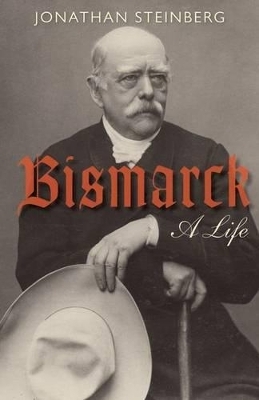
Bismarck
Oxford University Press (Verlag)
978-0-19-964242-7 (ISBN)
This is the life story of one of the most interesting human beings who ever lived. A political genius who remade Europe and united Germany between 1862 and 1890 by the sheer power of his great personality. It takes the reader into close proximity with a human being of almost superhuman abilities. We see him through the eyes of his secretaries, his old friends, his neighbours, his enemies and the press.
Otto von Bismarck 'made' Germany but never 'ruled' it. For twenty eight years he acted as a prime minister without a party. He made speeches, brilliant in content but hesitant in delivery, and rarely addressed a public meeting. He planned three wars and after a certain stage in his career always wore military uniform to which he had no claim. The 'Iron Chancellor', the image of Prussian militarism, suffered from hypochondria and hysteria.
Contemporaries called him a 'dictator' and several observers credited him with 'demonic' powers'. They were not wrong. The sheer power of his remarkable 'sovereign sel' awed even his enemies. William I observed that it was hard to be emperor under a man like Bismarck. He towered physically and intellectually over his contemporaries. His spoken and written prose sparkled with wit, insight, grand visions and petty malice. He united Germany and transformed Europe like Napoleon before and Hitler after him but with neither their control of the state nor command of great armies. He was and remained a royal servant.
This new biography explores the greatness and limits of a huge and ultimately destructive self. It uses the diaries and letters of his contemporaries to explore the most remarkable figure of the nineteenth century, a man who never said a dull thing or wrote a slack sentence. A political genius who combined creative and destructive traits, generosity and pettiness, tolerance and ferocious enmity, courtesy and rudeness - in short, not only the most important nineteenth-century statesman but by far the most entertaining.
Jonathan Steinberg is the Walter H. Annenberg Professor of Modern European History at the University of Pennsylvania, and Emeritus Fellow, Trinity Hall, Cambridge. He is the author of Yesterday's Deterrent: Tirpitz and the Birth of the German Battle Fleet (1965), Why Switzerland? (2nd ed.1996) and All or Nothing: The Axis and the Holocaust, 1941 to 1943 (classic edition 2002). He was also the principal author of The Deutsche Bank and its Gold Transactions during the Second World War (1999).
1. Introduction: Bismarck's 'Sovereign Self' ; 2. Born Prussian and What that Meant ; 3. Bismarck: The 'Mad Junker' ; 4. Bismarck Represents Himself, 1847-1851 ; 5. Bismarck as Diplomat, 1851-1862 ; 6. Power ; 7. 'I have beaten them all! All!' ; 8. The Unification of Germany, 1866-1870 ; 9. The Decline Begins: Liberals and Catholics ; 10. 'The Guest House of the Dead Jew' ; 11. Three Kaisers and Bismarck's Fall from Power ; 12. Conclusion. Bismarck's Legacy: Blood and Irony ; Notes ; Bibliography ; Index
| Erscheint lt. Verlag | 16.8.2012 |
|---|---|
| Zusatzinfo | 16pp black & white plates, 3 maps |
| Verlagsort | Oxford |
| Sprache | englisch |
| Maße | 156 x 233 mm |
| Gewicht | 809 g |
| Themenwelt | Literatur ► Biografien / Erfahrungsberichte |
| Sachbuch/Ratgeber ► Geschichte / Politik | |
| Geschichte ► Allgemeine Geschichte ► Neuzeit (bis 1918) | |
| Geisteswissenschaften ► Geschichte ► Regional- / Ländergeschichte | |
| ISBN-10 | 0-19-964242-7 / 0199642427 |
| ISBN-13 | 978-0-19-964242-7 / 9780199642427 |
| Zustand | Neuware |
| Haben Sie eine Frage zum Produkt? |
aus dem Bereich


